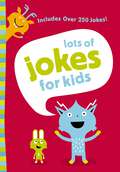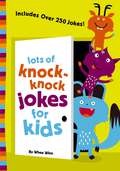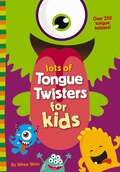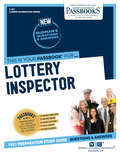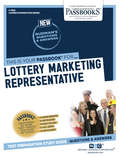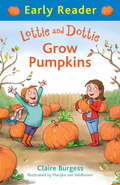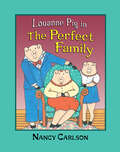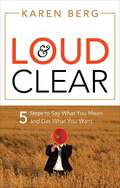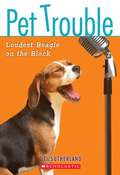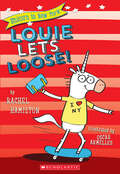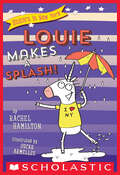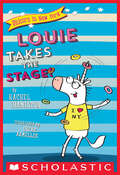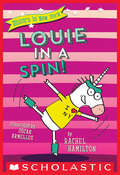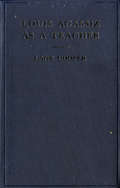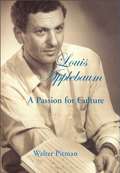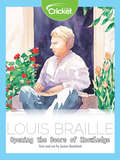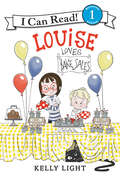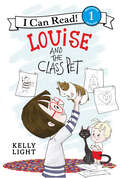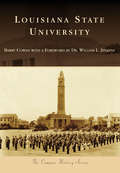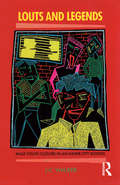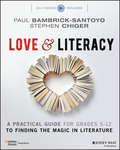- Table View
- List View
Lots of Jokes for Kids
by ZondervanQ: What do you get when you cross a parrot and a centipede? A: A walkie-talkie! Q: What kind of light did Noah install on the ark? A: Floodlights Introducing a collection of jokes that’s hilarious, clean, and kid-friendly and includes everything from knock-knock jokes, to Q&A jokes, tongue twisters, and a whole lot more. Lots of Jokes for Kids is certain to have every kid you know laughing out loud, snorting riotously, and generally gasping for air.
Lots of Knock-Knock Jokes for Kids
by ZondervanKnock, knock. Who’s there? Woo. Woo who? Don’t get so excited, it’s just a joke.Knock, knock. Who’s there? Anita. Anita who? Anita to borrow a pencil.New from Zonderkidz, here’s a collection of knock-knock jokes that’s both hilarious and wholesome. Lots of Knock-Knock Jokes for Kids is sure to send every kid you know to his knees in a breath-stealing, side-splitting, uncontrollable fit of giggles—it’s that funny. And with more than 350 jokes, the laughs are sure to never quit.This collection provides fun for the whole family and includes bonus Q&A jokes and riddles too!
Lots of Tongue Twisters for Kids
by Whee WinnGet ready to laugh out loud with Lots of Tongue Twisters for Kids, a collection of hilarious, kid-friendly fun. Over 250 tongue twisters will send kids and grown-ups alike into a fit of giggles! <P><P>How much wood would a woodchuck chuck if a woodchuck could chuck wood? <P><P>If two witches watch two watches, which witch would watch which watch?
Lottery Inspector: Passbooks Study Guide (Career Examination Series)
by National Learning CorporationThe Lottery Inspector Passbook® prepares you for your test by allowing you to take practice exams in the subjects you need to study. It provides hundreds of questions and answers in the areas that will likely be covered on your upcoming exam.
Lottery Marketing Representative: Passbooks Study Guide (Career Examination Series)
by National Learning CorporationThe Lottery Marketing Representative Passbook® prepares you for your test by allowing you to take practice exams in the subjects you need to study. It provides hundreds of questions and answers in the areas that will likely be covered on your upcoming exam, including but not limited to: marketing; providing good customer service; understanding and interpreting tabular material; understanding and interpreting written material; and more.
Lottie and Dottie Grow Pumpkins (Early Reader)
by Claire BurgessA brand new blue Early Reader about two little girls who love gardening, with tips on growing your own pumpkins in time for Halloween from one of the UK's top gardening bloggers.Early Readers are stepping stones from picture books to reading books, perfect for building confidence in new readers and reluctant readers. A blue Early Reader is perfect for sharing and reading together. A red Early Reader is the next step on your reading journey.Halloween is coming and Lottie and Dottie are growing their very own pumpkins. From making yummy soup to carving scary faces, there are lots of things for them to make and do.Perfect for budding gardeners. Contains instructions on how to grow your own pumpkins.
Louanne Pig in The Perfect Family, 2nd Edition (Nancy Carlson's Neighborhood Ser.)
by Nancy CarlsonLouanne’s an only child. She thinks that it would be fun to have a big family, just like her neighbor George. He has five sisters and four brothers—the perfect size. When her parents have to leave town for the weekend, Louanne jumps at the chance to stay with George. But during her stay, there’s too much snoring, a long line for the bathroom, and absolutely nowhere to be alone. Maybe three is the perfect number after all!
Loud & Clear: 5 Steps to Say What You Mean and Get What You Want
by Karen BergHow to be heard through the noise: “A must read for today’s busy, 24/7 professional who needs to communicate both thoughtfully and instantaneously.” —Mark Herman, EVP, Booz Allen HamiltonLoud & Clear is an essential guide to the effective communication skills that help you get what you want. Whoever you need to get a message through to—an employer, team, committee, staffer, neighbor, teacher, student, or spouse—this book will show you how to get their attention by:• Using your head. Before you even think about opening your mouth, you need to think long and hard about the person you want to influence and how to say what you want.• Connecting with your listener(s). How to establish chemistry and intimacy with your listeners—from an individual to a stadium-sized audience—to make them want to listen to you.• Keeping their interest. Why “soft” communication, such as storytelling and picture-painting, are important devices, and how to use them effectively. Plus, how to avoid the dreaded “drone factor.”• Saying it right. Speech and body language techniques make a lasting impression.• Anticipating and overcoming the negatives. How to recognize disaster before it strikes, and handle it when it does.Each chapter also features a topic-specific “plan of attack,” plus client stories, checklists, worksheets, and quizzes. It can be hard to get through in today’s noisy world—but for those trying to get a raise, motivate a team, organize a group, or just get better customer service, these proven methods help you say what you mean to get what you want.
Loudest Beagle on the Block (Pet Trouble, Book #2)
by Tui T. SutherlandWhen Ella's great aunt's beagle comes to live at her house, Ella doesn't think she has time for a dog, especially when it turns out that every time the beagle hears music, she wants to sing along! How is Ella supposed to win the talent show when all she can hear every time she rehearses is AAOOOWWAAAOOOOOO?
Louie Lets Loose! (Unicorn in New York #1)
by Rachel HamiltonFame meets Unicorn School in this wonderfully wacky illustrated series!Louie the Unicorn is a star! At least, he will be once he polishes his act at performing arts school. With a song in his heart, a spring in his step, and an unwaveringly sunny outlook, he's about to take the big city by storm. It's time for this unicorn to shine!But his ride to super stardom is bumpy -- the school already has a superstar unicorn, not to mention singing mermaids and dancing trolls. And apparently you can't pay for things with glitter! But Louie isn't giving up. His irrepressible spirit can't be tamed. And he's about to take a big bite out of the Big Apple so he can see his name in lights!
Louie Makes a Splash! (Unicorn in New York #4)
by Rachel HamiltonFame meets Unicorn School in this wonderfully wacky illustrated chapter book series!Louie the Unicorn is a star! At least, he will be once he polishes his act at performing arts school. With a song in his heart, a spring in his step, and an unwaveringly sunny outlook, he's about to take the big city by storm. It's time for this unicorn to shine!Louie's friend Miranda, a mermaid with a beautiful singing voice, is the talk of the town. Her face is on posters, her tail is on T-shirts, and her name is up in lights. But when fame goes to her head, it's up to Louie to remind her who her friends really are.
Louie Takes the Stage! (Unicorn in New York #2)
by Rachel HamiltonFame meets Unicorn School in this wonderfully wacky illustrated series!Louie the Unicorn is a star! At least, he will be once he polishes his act at performing arts school. With a song in his heart, a spring in his step, and an unwaveringly sunny outlook, he's about to take the big city by storm. It's time for this unicorn to shine!Louie and his class are putting on their first big show! But everything is going wrong. Louie's audition tricks don't amuse anyone. His best friend gets cast in the wrong part. Louie even sets the stage on fire! But the show must go on. Can Louie save the day?
Louie in a Spin! (Unicorn in New York #3)
by Rachel HamiltonFame meets Unicorn School in this wonderfully wacky illustrated chapter book series!Louie the Unicorn is a star! At least, he will be once he polishes his act at performing arts school. With a song in his heart, a spring in his step, and an unwaveringly sunny outlook, he's about to take the big city by storm. It's time for this unicorn to shine!Louie's school has dance fever! But Louie's moves aren't exactly graceful. His dance teacher doesn't know how she'll ever train a unicorn with two left feet. Lucky for her, Louie has hooves! But when Louie mistakenly gets entered into a HUGE state-wide dance contest, everyone at school worries he'll make them lose for sure. Louie's going to have to give it his all and shake what his mama gave him if they are going to stand a chance!
Louis Agassiz as a Teacher: Illustrative Extracts on His Method of Instruction
by Lane CooperBy a succession of living pictures, as it were, this book shows the eminent naturalist in the very act of teaching. Sometimes he himself speaks, sometimes distinguished pupils of his reveal in their own words the process by which they were led to nature through direct and independent observation. The enthusiasm of their accounts is contagious.This collection of illustrative extracts on the ideals and practice of Louis Agassiz is probably unique in giving the actual methods of a great man of science in developing good students who could, in their turn, wisely instruct others. The book should be in the hands of all teachers, and of those who are preparing to teach.
Louis Applebaum: A Passion for Culture
by Walter PitmanCanadian composer Louis Applebaum devoted his life to the cultural awakening of his native land, and this "magnificent obsession" drove him to become a founder of the Canadian League of Composers and the Canadian Music Centre. He was an instrumental figure in the early development of the National Film Board, the Stratford Festival, and the National Art Centre in Ottawa. For nearly half a century he composed music for the Stratford Festival, television, radio, and films. This illustrated biography explores the man who was beloved by his fellow artists and the icon to whom every Canadian, knowingly or not, is indebted.
Louis Braille: Lives of the Physically Challenged Series)
by Jennifer Fisher BryantA biography of Louis Braille which is written for young adult readers. An excellent choice for a book report.
Louis Braille: Opening the Doors of Knowledge
by James RumfordIn the late 1700s, young Louis Braille overcame his disability by inventing "night writing," a system of raised dots to help blind people read. This alphabet of raised dots allowed sightless people to live more independent lives.
Louise Loves Bake Sales (I Can Read Level 1)
by Kelly LightLouise loves all kinds of art. But when she has to make cupcakes for a bake sale—and everything goes wrong—can she and her brother make messy cupcakes into art? This charming I Can Read story also introduces the concept of how mixing primary colors makes new ones, and that creativity comes in all different forms.Louise Loves Bake Sales is a Level One I Can Read book, which means it’s perfect for children learning to sound out words and sentences. This is the first Level One I Can Read starring Louise, from the acclaimed picture book Louise Loves Art.
Louise and the Class Pet (I Can Read Level 1)
by Kelly LightLouise is so excited! The class pet, Pigcasso, is staying over for the weekend! Louise’s cat is not as excited as she is, though.... Can they all make it through the weekend? Louise and the Class Pet is a Level One I Can Read book, which means it’s perfect for children learning to sound out words and sentences. This is the second Level One I Can Read starring Louise, from the acclaimed picture book Louise Loves Art.
Louisiana State University
by Dr William Jenkins Barry CowanLouisiana State University began in 1860 as a small, all-male military school near Pineville. The institution survived the Civil War, Reconstruction politics, and budgetary difficulties to become a nationally and internationally recognized leader in research and teaching. A devastating fire destroyed the campus in 1869, and the school moved to Baton Rouge, where it has remained. Successive moves to larger campuses in 1887 and 1925 created greater opportunities in academics, student life, and athletics. Academics began with classical and engineering courses. New majors in the arts, literature, engineering, agriculture, and the sciences evolved, along with research in those fields. Student life changed from military regimentation to coeducation and students' freedom to live off campus and make their own decisions. Intercollegiate athletics began in 1893 with baseball and football games against Tulane, and the LSU Tigers have since won numerous championships. These evolutionary steps all helped to create Louisiana's flagship university.
Louts and Legends: Male youth culture in an inner-city school
by J. C. WalkerFor five years, Jim Walker followed the stories of four groups of young men, from their last years at an inner-city high school to their early twenties. Louts and Legends is a rich portrayal of their ways of life, their responses to school and teachers, and their experience of job-seeking, employment, unemployment, further education and training.Louts and Legends presents a unique perspective on Australian culture, showing the problems, achievements, and social context of four distinct cultural styles: the macho 'Aussie' culture of the footballers; the competitive challenge of the Greeks; the 'nice guy' friendliness of the handballers; the artistic aspirations of the stigmatised three friends.The interview and participant observation data gathered over a long period contains fresh insights on youth culture as well as moving individual stories. The findings in this book pose a challenge to educational and social policy, but they also offer realistic suggestions for teachers, youth workers, parents and for other young people.
Loué sois-tu: lettre encyclique Laudato si' sur la sauvegarde de la maison commune
by Église Catholique FrançoisLoué sois-tu (Laudato si'), tel est le titre de l'encyclique du Pape François sur l'écologie et le respect de la création. Le discours du Pape se situe au niveau éthique et pastoral et confirme le souci manifesté depuis le début de son pontificat pour deux concepts-clé : l'urgence de la sauvegarde de la création et la lutte contre ce qu'il appelle la culture du déchet. 2015.
Love & Literacy: A Practical Guide to Finding the Magic in Literature (Grades 5-12)
by Paul Bambrick-Santoyo Stephen ChigerWhen our students enter middle and high school, the saying goes that they stop learning to read and start reading to learn. Then why is literacy still a struggle for so many of our students? The reality is that elementary school isn’t designed to prepare students for Othello and Song of Solomon: so what do we do? Love and Literacy steps into the classrooms of extraordinary teachers who have guided students to the highest levels of literacy. There is magic in their teaching, but that magic is replicable. It starts with a simple premise: kids fall in love with texts when they understand them, and that understanding comes from the right knowledge and/or the right strategy at the right time. Love and Literacy dissects the moves of successful teachers and schools and leaves you with the tools to make these your own: Research-based best practices in facilitating discourse, building curriculum, guiding student comprehension and analysis, creating a class culture where literacy thrives, and more Video clips of middle and high school teachers implementing these practices An online, print-ready Reading and Writing Handbook that places every tool at your fingertips to implement effectively Discussion questions for your own professional learning or book study group Great reading is more than just liking books: it’s having the knowledge, skill, and desire to experience any text in all its fullness. Love and Literacy guides you to create environments where students can build the will and wherewithal to truly fall in love with literacy.
